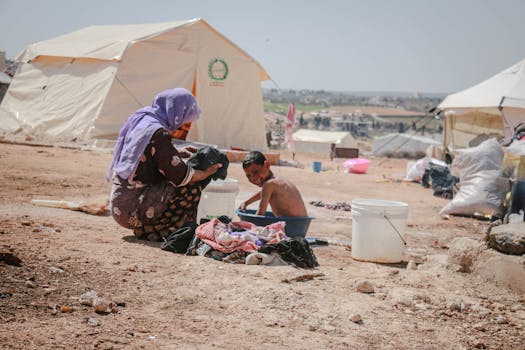Why Don’t Arab Countries Accept Palestinian Refugees
Photo by Nikolas Gannon on Unsplash
Introduction
This is a particularly thorny issue: Why do Arab nations seem unwilling to accept Palestinians? It’s a question repeatedly asked by Israel’s supporters, bearing two main implications: 1. That there is something terribly wrong with Palestinians that makes them unwanted, and 2. That Arab nations do not care about Palestinians. So let us unpack this.
Similar Propaganda Was Used Against Jews
One might expect Israeli Jews and their supporters to be the last to make such dehumanizing comments, considering the history of Jews under Nazi rule who suffered immensely due to similar propaganda. Is it fair to suggest that because Jews were expelled from many places historically, there must be something wrong with them? From the Neo-Assyrian Empire in 733 BCE to Babylon (modern-day Iraq) in 597 BCE, fast forward to 1493 in Italy, then to Rome in 50 CE. Let's not forget England at the beginning of the 20th century or France in 1306, the Iberian Peninsula between 1492-1497, the Spanish Inquisitions, WWII Nazi Germany, and the list goes on. The fact is, none of this is proof of anything other than the harsh reality that our world has always been a violent place with constant wars and injustices.
Photo by Karsten Winegeart on Unsplash
Arab Countries Like Jordan Already Have Palestinian Citizens
Consider Jordan, where millions of Palestinians still live today as citizens. Contrary to the narrative that Arab countries reject Palestinians because they are perceived as dangerous to their societies, Jordan's Palestinians have been there for decades. They are not just refugees but citizens and an integrated part of Jordanian society, with many even holding government positions like Anwar Bey Nuseibeh.
Arab Countries Are Governed by Dictatorship Regimes and Are Not Representative of the Arab Nation
It is interesting how people quickly forget who really holds the reins in Arab countries. Unless they want to make a point about Israel being the only democracy in the region, these authoritarian regimes suddenly become legitimate when making an argument against Palestinians. It is in the nature of such ruling forces to prioritize their political interests over any genuine humanitarian cause, such as the treatment of refugees. Moreover, it is not a secret that many of these regimes are supported, armed, and financed by foreign powers, which influences their loyalties. So why should we accept anything dictatorships do as being legitimate?
Hosting an Entire Population
And here lies a fundamental question: why should any country bear the burden of a conflict not of their own making? Hosting and integrating a displaced population goes far beyond mere hospitality; it comes at heavy economic and social costs. This is a massive undertaking, especially for nations already grappling with their own internal challenges.
Why are Arab countries burdened with this responsibility? Which law says that Arab countries must be Israel’s backyard where they can dump unwanted populations?

Photo by Ahmed akacha on Pexels
Depopulation of Palestine
Now, let’s tackle a particularly obvious issue: Could welcoming and integrating more Palestinian refugees cause a blow to the Palestinian claim to their lands? Could that encourage Israel or other powers to normalize the process of expelling people into nearby countries and then taking their lands? The Israeli Law of Return clearly states that only Jews can return. Therefore, facilitating the process of the transfer of Palestinians is an existential threat to the very existence of the Palestinian people. And who holds the right to decide the fate of another nation?
Arab Support of Palestine
Despite efforts to isolate them, the Palestinian cause still holds a strong place among Arabs, even amidst many other conflicts. People across the Arab world have always had a deep connection with the Palestinians, viewing them and their cause as a shared struggle rather than a problem. This sense of unity shows that the negative claims about Palestinians are unfounded. In the first weeks of the Gaza assault alone, hundreds of thousands of people in the Arab world took to the streets in solidarity. Social media platforms were flooded with messages of support, hashtags, and campaigns.
Palestinians Were Expelled Many Times
Israeli supporters use this rhetoric as an example that Arabs don’t want Palestinians. Interestingly, according to their narrative, Arab countries expelled Jews in 1948. They assert that this expulsion was an act of aggression against Jews. Conversely, when discussing the expulsion of Palestinians, the narrative shifts: now, Arab countries are seen as victims, and Palestinians are portrayed as the bad guys. This dichotomy raises questions about the consistency of these claims. So let’s not pretend that actions by undemocratic, dictatorial governments are somehow legitimate when it comes to dehumanizing people you oppose.
Palestinians Betrayed Their Host Countries
We occasionally hear statements like these: Palestinians tried to overthrow the monarchy in Jordan, or Palestinians were expelled from Kuwait for supporting Saddam Hussein. While it's true that the Palestine Liberation Organization (PLO) viewed the Jordanian regime as a barrier to Palestinian repatriation and admired Saddam’s pro-Palestine stance, these actions do not inherently define all Palestinians. Like any other group, Palestinians tend to support those who advocate for their cause and distance themselves from those who oppose it. However, it is unjust to assume that the actions of the PLO represent all Palestinians at all times.
Would it be fair to apply the same standards to Jews in Arab countries who collaborated with Israel to sabotage the entire country, like in the Lavon Affair, for example?
Dehumanizing Palestinians
These types of arguments aim to dehumanize Palestinians and justify the atrocities committed against them. It also aims to paint Israel as a victim of the unwanted population and their Arab neighbors as evil entities that aren’t doing enough to help uproot Palestinians from their lands.

